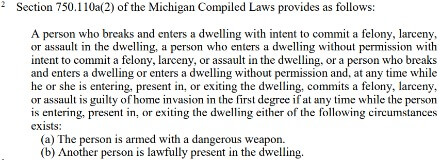- Introduction: Matter of Jasso Arangure, 27 I&N Dec. 178
- Factual and Procedural History: 27 I&N Dec. at 178-80
- Relevant Statutes and Issues: 27 I&N Dec. at 179-80
- Board Determines that Conviction Was Categorical Aggravated Felony Burglary: 27 I&N Dec. at 185-86
- Conclusion
Introduction: Matter of Jasso Arangure, 27 I&N Dec. 178
On December 29, 2017, the Board of Immigration Appeals (BIA) issued a published for-precedent decision in Matter of Jasso Arangure, 27 I&N Dec. 178 (BIA 2017) [PDF version]. We have broken our discussion of Matter of Jasso Arangure into two articles in order to cover its two divergent points. The most significant holding — that the Department of Homeland Security (DHS) is not precluded by res judicata from initiating a separate proceeding to remove an alien as an alien convicted of an aggravated felony after having initiated an original proceeding to remove an alien based on the same charge and conviction but a different aggravated felony — is covered in our main article on Matter of Jasso Arangure [see article]. In this article, we will examine the Board’s analysis of whether the respondent’s conviction of home invasion in the first degree in violation of Michigan Compiled Laws section 750.110a(2) was a categorical aggravated felony burglary offense under section 101(a)(43)(G). As we will find, the Board held that the respondent’s conviction was a categorical aggravated felony burglary offense.
Factual and Procedural History: 27 I&N Dec. at 178-80
We discussed the overall factual and procedural history of Matter of Jasso Arangure in detail in our main article on the case. Accordingly, we will incorporate that discussion by reference and through the following link [see section]. In the following passages, we will discuss the aspects of the factual and procedural history that are pertinent to the question of whether the respondent’s conviction was a categorical aggravated felony burglary offense under section 101(a)(43)(G).
On December 1, 2014, the respondent, a native and citizen of Mexico and a lawful permanent resident of the United States, entered a guilty plea to the charge of home invasion in the first degree under section 750.110a(2) of the Michigan Complied Laws. As a result of the conviction, he was sentenced to a term of imprisonment of 18 months to 20 years.
On September 15, 2016, the DHS issued a notice to appear, charging that the respondent was removable under section 237(a)(2)(A)(iii) as an alien convicted of an aggravated felony. Specifically, the DHS charged that the respondent’s conviction was an aggravated felony burglary offense under section 101(a)(43)(G) of the INA.
In December 2016, the Immigration Judge sustained the removal charge against the respondent and ordered him removed. The respondent appealed from the Immigration Judge’s decision to the BIA.
Relevant Statutes and Issues: 27 I&N Dec. at 179-80
Under section 101(a)(43)(G) of the INA, a “burglary offense for which the term of imprisonment is at least one year” is an aggravated felony under the immigration laws.
The question in the instant case is whether the respondent’s conviction in violation of section 750.110a(2) was an aggravated felony burglary offense. The following is the relevant statute, excerpted from the Board’s decision at 27 I&N Dec. at 179 n.2:
[Click image to view full size]
On appeal, the respondent argued that the Immigration Judge erred in determining that his conviction was a categorical aggravated felony under section 101(a)(43)(G). The fact that the term of imprisonment for the respondent’s conviction was “at least one year” was undisputed. However, the respondent argued that the statute of conviction was divisible, that is, it set forth distinct elements (things that must be proven in order to prove guilt) in the disjunctive. Specifically, the respondent argued that the statute criminalized “entering (or breaking and entering) with the intent to commit a crime or committing a crime while entering, while present in, or while leaving a dwelling.” The respondent took the position that the second element fell outside of the scope of section 101(a)(43)(G) and that he had pled guilty to the second element and not to the first element. The DHS took the position that the statute categorically criminalized conduct that fell under the scope of section 101(a)(43)(G).
To explore these issues in depth, please see an interesting series of articles we have on a series of cases dealing with the categorical approach and divisibility [see article].
Board Determines that Conviction Was Categorical Aggravated Felony Burglary: 27 I&N Dec. at 185-86
The Board agreed with the Immigration Judge’s finding that section 750.110a(2) of the Michigan Compiled Laws categorically defined aggravated felony burglary. We will examine the Board’s analysis in this section.
The Board explained that the elements of “breaking and entering” under the statute require that the defendant (quoted):
1. Broke into a dwelling; and
2. Entered the dwelling; and
3. Either intended to commit an offense when breaking and entering or committed the offense when entering, present in, or leaving the dwelling; and
4. When entering, present in, or leaving the dwelling, was armed with a dangerous weapon and/or another person was lawfully present in the dwelling.
Citing to M. Crim. JI 25.2a.
The Board explained that the elements of the crime “entering without permission” under the same statute require that the defendant (quoted):
1. Entered a dwelling without permission; and
2. Either intended to commit an offense while entering, or committed the offense when entering, present in, or leaving the dwelling; and
3. When entering, present in, or leaving the dwelling, was armed with a dangerous weapon and/or another person was lawfully present in the dwelling.
Citing to M. Crim. JI 25.2c.
The Board further explained that the Supreme Court of the United States defined generic burglary in Taylor v. United States, 495 U.S. 575, 598 (1990) [PDF version] “an unlawful or unprivileged entry into, or remaining in, a building or other structure, with intent to commit a crime.”
The respondent argued that the portion of the statute that he was convicted under, committing a crime while “in the act of entering, while being present in, or while leaving a dwelling” fell outside the scope of the generic crime of burglary as defined by the Supreme Court in Taylor. The Board rejected this argument, however, agreeing with the Immigration Judge and the DHS that the statute, “if anything, may narrow the scope of the statute’s definition of burglary, rather than expanding it to include conduct outside of the generic definition.”
Furthermore, the Board agreed with both the Immigration Judge and the DHS that “the entirety of” section 750.110a(2) of the Michigan Compiled Laws “falls within the generic burglary definition and that the offense of home invasion is an aggravated felony under section 101(a)(43)(G)…” The Board noted that the United States Court of Appeals for the Sixth Circuit held in United States v. Quarles, 850 F.3d 836, 840 (6th Cir. 2017) [PDF version], that third degree home invasion under Michigan law was categorically equivalent to generic burglary (note the respondent in the instant case was convicted of first degree home invasion under Michigan law). In that case, the Sixth Circuit held that generic burglary, “as defined in Taylor, does not require intent at entry; rather the intent can be developed while ‘remaining in’ the dwelling without permission.” Furthermore, the Board added that Quarles relied on a prior Sixth Circuit decision in United States v. Priddy, 808 F.3d 676, 685 (6th Cir. 2015), which it described as “reject[ing] the very argument advanced by the respondent.” (Note: Priddy was abrogated on other grounds by United States v. Stitt, 860 F.3d 854, 858-60, 862-63 (6th Cir. 2017) (en banc)).
Conclusion
The second part of Matter of Jasso Arangure involved a straight-forward analysis of whether a specific statute was a categorical burglary offense as described by section 101(a)(43)(G). In that sense, it provides an example of how the Board assesses whether specific convictions are aggravated felonies. If an alien is charged as removable, he or she should consult with an experienced immigration attorney immediately for case-specific guidance.
Please make sure to see our companion article on the main part of the Matter of Jasso Arangure decision dealing with the applicability of res judicata in removal proceedings involving aggravated felonies [see article]. Please also see our full list of articles on published immigration decisions [see article], including those on aggravated felonies [see section].






